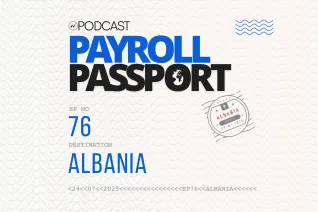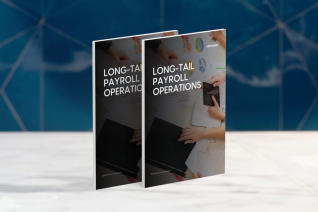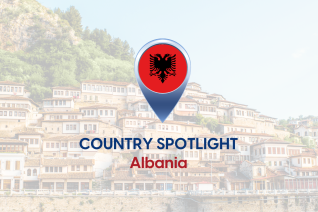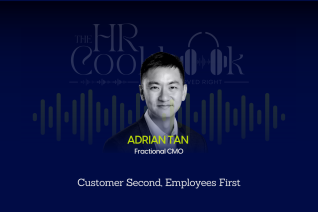Establish your presence globally with Neeyamo as we help you go beyond borders to manage your international payroll and hire new talent in Albania.
Overview
Albania, located in Southeastern Europe on the Balkan Peninsula, is bordered by Montenegro, Kosovo, North Macedonia, and Greece, with coastlines along the Adriatic and Ionian Seas. The country is known for its welcoming culture and strong community traditions, such as the evening social walk known as “Xhiro.”
Albania has a growing, reform-driven economy with key industries including tourism, agriculture, textiles, construction, and energy. The workforce is young, educated, and increasingly skilled, particularly in IT, services, and manufacturing. Ongoing economic and legal reforms continue to align Albania’s labor and business environment with European Union standards.
Do your organization’s expansion plans require you to hire employees in Albania? Do you lack a physical entity in the country – a key requisite to hire local talent? Neeyamo's Global Payroll Solutions and Employer of Record services assist organizations worldwide with onboarding and managing employees in Albania -processing payroll, managing local compliance requirements, benefits, and more.
Tools And Instances
Facts And Stats
Capital
Tirana (Tirane)
Currency
Albania Lek (ALL)
Official Language
Albanian
Fiscal Year
1 January - 31 December
Date Format
DD/MM/YYYY
Country Calling Code
+355
Other Languages
Tosk (South) and Gheg (North) dialects of Albanian
Time Zone
UTC+1 (Central European Time); UTC+2 during Daylight Saving Time (March–October)
Global Payroll
Overview
Handling payroll for a widespread workforce can pose a significant challenge for any organization, and the added complication of compliance can make things worse. If companies spend more time processing payroll, it directly impacts day-to-day operations and their overall productivity.
Over the years, Neeyamo has observed these complexities and strived to provide a global payroll solution through a single technology platform - Neeyamo Payroll.
What is a Payroll System?
A payroll system is a software that is used to manage employee payments, inclusive of their wages, deductions, bonuses, etc.
What is Payroll Tax?
Payroll tax is the percentage amount retained from an employee's salary and paid to the government to invest in the general population's welfare. These are statutory in nature and are levied from both the employer and employee. Additional statutory contributions are made by employers towards aiding both short-term and long-term benefits for their employees.
Employement Taxes
|
Types of Contribution |
Rate |
|---|---|
|
Social Insurance |
9.5% |
|
Health Insurance |
1.7% |
|
Total Employee Contribution |
11.2% |
|
Types of Contribution |
Rate |
|---|---|
|
Social Insurance |
15% |
|
Health Insurance |
1.7% |
|
Total Employer Contribution |
16.7% |
Personal Income Tax (PIT)
- The tax on personal income is applied to the incomes of individuals.
- Resident individuals are subject to tax on worldwide income earned during the tax period.
- Non-resident individuals are subject to tax only on income sourced within Albania during the tax period.
|
Monthly Income Range (ALL) |
Tax Rate |
|---|---|
|
Up to 30,000 |
0% |
|
30,001 – 150,000 |
13% of the amount over 30000 |
|
Above 150,000 |
ALL 15,600 + 23% of the amount over 150,000 |
Payroll Cycle
Overview
Payroll in Albania refers to the process and schedule through which employers compensate their employees for work performed during a specific period. The payroll frequency and payment dates may vary depending on the company’s internal policy, but they must comply with Albanian labor law requirements..
Frequency
The standard payroll cycle in Albania is monthly. Employees are typically paid by the end of each month for the work performed during that month.
13th Month Cycle
There is no statutory requirement in Albania for employers to pay a 13th or 14th month salary.
Global Work
Overview
What is Employer of Record?
An Employer of Record (EOR) service provider helps you eliminate the hassle of handling complexities while onboarding a new employee in an international location. They help bridge the gap that otherwise mandates organizations to have a locally registered entity and a local bank account before making a job offer to an international hire.
An EOR service provider acts as a legal employer, facilitates salary payments, and manages other statutory requirements such as health insurance, payroll taxes, and employee benefits, ensuring compliance with local tax laws and regulations.
This allows organizations to focus on collaborating with the employee in Albania for operational tasks, with the knowledge that they have a cost-effective solution to support their global payroll & HR requirements as they continue their global expansion.
Neeyamo using its Cloud-based HR and Payroll services strives to provide its customers with a seamless employee management experience and offers employer of record as well with our Global Payroll Technology Stack.
HR Mandates and Practices
Minimum Wage
The national minimum monthly wage in Albania is ALL 40,000 (approximately €400), effective from April 1, 2023.
The Government of Albania has announced a planned increase in the minimum wage to ALL 50,000 (approximately €500) per month, effective from January 2026. However, this increase is not yet formally enacted and remains pending official approval.
Working Hours and Overtime
Normal working time is 40 hours per week. Overtime (hours above 40/week) must be compensated at least at 125% of the regular rate (i.e., +25 %).
Work on weekends or public holidays (or during the rest day) must be compensated at least at 150% of the regular rate (i.e., +50 %) unless otherwise agreed.
The total overtime in a calendar year should not exceed 200 hours. An employer may not require overtime if the employee has already worked 48 hours in a week, except in exceptional circumstances (e.g., for up to 4 months period) where the average may not exceed 48 hours/week.
Data Retention Policy
Employers must keep employee personal data securely (physical or electronic) and comply with the national personal data protection law. Specific records that must be retained include salary/benefit data, income tax, social security and health contribution records — these must be kept for 5 years under applicable tax/insurance legislation. Employers must also maintain a separate registry of work-related accidents and occupational illnesses, which should be kept for 5 years and then archived at the relevant Social Security regional directory.
Hiring and Onboarding Requirements
Hiring
In Albania, employment discrimination is strictly prohibited under the Labour Code and the Law on Protection from Discrimination, ensuring equal opportunity in recruitment. Employers must not include any discriminatory criteria in job advertisements or hiring practices. Currently, there are no legally mandated hiring preferences or quotas for any specific group. Although discussions have been held regarding a 30% gender quota for women on supervisory boards of listed companies, no binding legislation has yet been enacted.
Onboarding
- Full name of candidate
- Date of birth
- Address (current residence)
- Contact number
- Nationality
- Copy of national identity card (for Albanian nationals) OR copy of passport (for foreign nationals)
- Copy of a valid work permit (for foreign nationals)
- Educational qualifications/certificates (only if relevant for the job)
- Previous employment details (only if relevant for the job)
- Medical certificate or health‐fitness certificate (where required by role or internal policy)
- Consent form for processing personal/sensitive data (to comply with data protection legislation)
Probation
- The probation period may last up to 3 months from the start of employment.
- It does not apply if the employee has previously worked under a contract for the same position with the employer.
- The period may be reduced or waived through a written agreement or a collective contract.
- During probation, either party may terminate the employment with at least 5 days’ written notice.
Leave
Public Holidays
Albania observes 14 official public holidays each year. If a public holiday falls on a weekend, the following working day is usually observed as the day off. Some religious holidays are based on the lunar calendar, and their exact dates vary each year.
- New Year's Day (2 Days)
- Summer Day
- Nevruz Day
- Id-al-Fitr (End of Ramadan)
- Easter Sunday
- Easter Monday
- Labour Day
- Eid Al Adha
- Saint Teresa Canonsisation Day
- Alphabet Day
- Independence Day (Flag Day)
- Liberation Day
- National Youth Day
- Christmas Day
Annual Leave
Under the amended Labour Code of Albania (Law No. 91/2024, effective August 2024), employees are entitled to a minimum of 22 working days of paid annual leave for each full year of employment. The amendment increased the entitlement from the previous four calendar weeks to 22 working days. Additionally, the earlier requirement that employees must take at least one uninterrupted week of leave has been abolished, allowing greater flexibility to take leave in shorter segments as agreed between the employer and employee. These changes apply to all employment contracts, including those already in effect at the time the amendment came into force.
Sick Leave
Employees who are temporarily unable to work due to illness or injury are entitled to paid sick leave. The employer must pay at least 80 percent of the employee’s salary for the first 14 days of sick leave during a calendar year. From the fifteenth day onward, payment is covered by the Social Insurance Institute according to the employee’s contribution history and average salary. A valid medical certificate is required to justify the absence.
Maternity Leave
Female employees are entitled to maternity leave of up to 365 calendar days in total, covering both pre-natal and post-natal periods. The pre-natal period consists of 35 days before the expected date of childbirth, or 60 days in case of multiple births, followed by 63 days of post-natal leave. Maternity leave benefits are paid through the social insurance system, and the employee’s position is protected throughout the leave period.
Childcare Leave
Under Article 132 of the Albanian Labour Code, employees are entitled to up to 12 days of paid leave per year to care for dependent children. For employees with children under the age of three, up to 15 days of paid leave per year is granted when the child is ill and the illness is certified by a medical report. In addition, employees may take up to 30 days of unpaid leave per year for the same purpose. The leave is granted to the parent who actually provides the care and, where both parents are employed, it may be taken alternately. Employers have the right to verify the medical certificate through another doctor in accordance with sick leave verification procedures.
Marriage Leave
Under Article 96(1) of the Labour Code of Albania, an employee is entitled to five days of paid leave in the event of their own marriage.
Bereavement Leave
Article 96(1) also provides that an employee is entitled to five days of paid leave in the event of the death of a spouse, parent, or direct descendant (such as a child). This leave allows employees to attend funeral arrangements and manage family matters during the period of loss.
Adoption Leave
Under Article 106 of the Labour Code and the Law on Social Insurance, a female employee who adopts a newborn or a child under one year of age is entitled to paid adoption leave of up to 330 days from the child’s birth, starting from the date of adoption but not earlier than the 42nd day after childbirth. The minimum benefit period is 28 days, and the leave is paid through the social insurance scheme, provided the adoptive mother has at least 12 months of insurance contributions.
Termination
Notice Period
During probation (up to 3 months): at least 5 days.
- Up to 6 months: at least 2 weeks.
- More than 6 months up to 1 year: at least 1 month.
- 2 to 5 years of service: at least 2 months.
- More than 5 years of service: at least 3 months.
Seniority bonus (if terminated by employer with correct process):
After 3 or more years’ service: the employee is entitled to at least ½-month salary for each full year of service, based on the salary at the termination date. Additional compensation may apply if the employer has not followed the required meeting/notice procedures.
Visa and Work Permit
Requirement
Foreign nationals intending to work in Albania must obtain a work permit before starting employment.
The application is usually processed within 30 days after submission of all required documents.Visa and Residence Permit
Depending on nationality, a visa may be required to enter Albania. For employment lasting more than 90 days, a residence permit is also mandatory in addition to the work permit.
Work Permit Categories
- Type A – For employees working under an employment contract (includes standard, seasonal, and intra-company transfer subtypes).
- Type B – For self-employed persons or investors conducting independent economic activity.
- Type C – For special or short-term assignments (e.g., contractual or occasional work).
- Type D – For permanent residence and employment, available to foreigners who have lawfully lived and worked in Albania for at least five consecutive years.
Validity and Renewal
Standard permits (Type A/B/C) are typically valid for one year and may be renewed. After continuous legal residence and employment, eligible foreigners may apply for a Type D (Permanent) work permit.
Employee Background Checks
Legal and Background Checks
- Background checks are permitted in Albania and regulated under Law No. 9887/2008 on Personal Data Protection, which aligns with EU data protection principles.
- Employers must have a lawful and job-related purpose for conducting any background screening.
Candidate Consent & Notification
- Employers must obtain the candidate’s explicit and informed consent before collecting or processing personal data.
- Candidates must be informed of the purpose, scope, and method of the background check, as well as whether third-party service providers will be used.
Types of Checks:
- Common checks include verification of identity, education, employment history, and criminal record (where relevant to the job).
- For certain regulated or sensitive roles, employers may request a Certificate of Good Conduct issued by competent authorities.
Data Retention & Confidentiality
- Personal data collected during background checks must be kept confidential and retained only for as long as necessary for the hiring purpose (typically up to six months unless extended with consent).
- Employers remain responsible for data protection compliance even if background checks are outsourced.
Last updated on November 05, 2025
If you have any queries or suggestions, reach out to us at irene.jones@neeyamo.com
Have Queries? Get In Touch With Us
Get in touch with one of our experts and take a quick demo of our services









